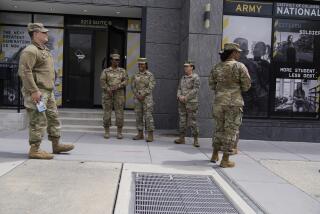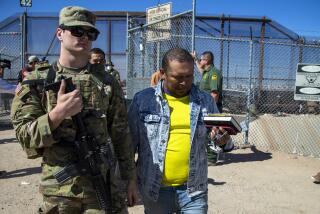Pentagon extends Army tours
- Share via
WASHINGTON — The Pentagon ordered 90-day extensions Wednesday for all active-duty Army troops in Iraq and Afghanistan, stretching their overseas tours from 12 to 15 months in a move that will exert new strain on a struggling military but allow the Bush administration to continue its troop buildup in Baghdad well into next year.
Defense Secretary Robert M. Gates’ announcement came amid expectations that the Pentagon was about to order longer tours for some units, but the new policy is a far more sweeping and drastic step, stretching deployments for more than 100,000 members of the Army.
“I realize this decision will ask a lot of our Army troops and their families,” Gates said, adding that it would ensure that the administration would not be forced to withdraw forces before it was ready. “This approach also upholds our commitment to decide when to begin any drawdown of U.S. forces in Iraq solely based on conditions on the ground.”
The extension order also came at a crucial time in the war and the political debate surrounding it as congressional Democrats push for troop withdrawals.
It marked the second time in four months that the administration has responded to pressure for withdrawals by taking a dramatic step to expand U.S. involvement in Iraq. The bipartisan Iraq Study Group in December recommended troop withdrawals, just weeks before President Bush announced the current buildup.
Gates said the extensions were not a signal that he had decided to stretch out the troop buildup.
But military experts said that by extending all of the active-duty brigades, the administration would be able to continue the increase into 2008.
“It was always envisioned that the only way you could do it [the troop increase] was to extend tours of duty; that was known right from the outset,” said Jack Keane, a retired Army general and one of the architects of the current strategy, who recommended across-the-board extensions in December.
The announcement also demonstrated how the partnership between Gates and the new top commander in Iraq, Army Gen. David H. Petraeus, differed from the team that preceded it.
Under former Defense Secretary Donald H. Rumsfeld, known for his preference for small numbers of ground forces, commanders were reluctant to demand more troops. But Petraeus has made it plain that he will ask for more troops if needed. So far, Gates has granted those requests.
“The good news here is we have a commander in Iraq who is saying what he needs,” said William Nash, a retired Army major general now at the Council on Foreign Relations.
Gates addressed a hastily convened news conference at the Pentagon as details of the extensions were given to unit commanders. Normally, units would be told of new orders 48 hours before any public announcement, but Gates moved up the announcement after news leaks revealed the likelihood of extensions.
Gates, angered by the leaks, said they caused “hardship not only for our service men and women, but their families, by letting them read about something like this in the newspapers.”
Gates’ decision will immediately affect about 79,000 soldiers in Iraq, 18,000 in Afghanistan and 7,000 in Kuwait, according to Army officials. The first combat units to be affected in Iraq will be those that were due to come home this summer.
The extensions do not affect the Marine Corps, whose members currently serve for seven months in Iraq before returning home for six months, or the National Guard.
The Minnesota National Guard’s yearlong tour was extended in January, when Bush announced the troop increase. But Pentagon officials since have promised they would mobilize Guard troops for only one year at a time, including training, which means their Iraq tours will probably be about 10 months.
Nash is among experts who see a likely connection between the extensions and the flexibility to continue the troop buildup.
“The fact is we are going to keep doing what we are doing,” Nash said. “Absolutely, it will go into next year. That is why they went to 15 months.”
He added: “To sustain the surge, they have to keep folks longer so you build up higher troop levels. This is a ‘plus up’ of the surge, in my view.”
The extensions also may signal that the administration believes that the initial buildup of forces is having a positive effect in Baghdad and in Al Anbar province, said Andrew F. Krepinevich Jr., a former Army major and an expert on counterinsurgency strategy who heads the Center for Strategic and Budgetary Assessments.
“We are reinforcing success; some things are breaking right for us,” he said. “Maybe Secretary Gates wants to generate real success so Congress will get off his back.”
But Krepinevich also added that the performance of Iraqi units continued to disappoint American military leaders. The extensions make it clear that the extra U.S. forces will need to take more of a leading role in operations for some months, he said.
The extensions allow the Army to continue the flow of forces into Iraq to sustain the troop increase without decreasing the training period at home -- what the military calls dwell time -- between deployments. Military experts have expressed concern over shrinking training time, saying it increased the risk of units being unprepared for complicated counterinsurgency combat.
While difficult for families of soldiers, the extensions are likely to mean that a more experienced group of soldiers is working the streets.
“The longer you spend with the people, the relationships you have with them, it all adds to the potential success of the operations. The more change you have, the tougher it is to build continuity,” Keane said.
But Paul Rieckhoff, founder of Iraq and Afghanistan Veterans of America, said there is little evidence that the lack of progress is due to short tours.
“Put yourself in the boots of those troops,” Rieckhoff said. “Fifteen months is a long time to be away from your spouse and children. This decision is undoubtedly going to have a negative impact on retention ... and the Army’s already strained recruiting.”
Toni Johnson, 24, thought she was prepared for life as a military wife when she married her high school sweetheart, Jeff, an Army mechanic based at Ft. Hood, Texas. But an extended war, and now news of a 15-month deployment, are testing her patience, she said.
“That’s three extra months without my husband, three extra months of our kids missing their father,” said Johnson, a Republican who voted for Bush. “It will definitely be a hardship.”
The couple have three children, ages 3, 4 and 9. “It’s hardest on the younger ones because they don’t understand why Daddy is gone,” Johnson said. “I underestimated how hard it is to be a military wife.”
Krepinevich, who once was extended for a month while serving in Korea, said there was no denying the deep effect the extensions would have on soldiers.
“The months start to seem like years after a while,” Krepinevich said. “On the other hand, this is what war is about. It is about ever-changing circumstances, it is about military leaders making tough choices, it’s about taking calculated risks. And that is what is going on here.”
As the Pentagon was announcing the extensions Wednesday, the White House said it was weighing the appointment of a new “high-profile” official to coordinate the assignment of personnel from the national security agencies to the wars in Iraq and Afghanistan.
“One of the considerations is to place someone of ... a slightly higher profile that can help cut through bureaucracy and make sure that these policies are being implemented to their best possible ability,” said Dana Perino, a White House spokeswoman.
She said no one had been offered the job so far.
A former senior defense official confirmed a report Wednesday in the Washington Post that Keane, retired Marine Gen. John J. Sheehan and retired Air Force Gen. Joseph W. Ralston had been approached about the job.
The former official said the White House proposal was not intended to usurp the authority of the Defense Department to run the war.
The extension order seemed likely to sharpen tensions between war critics in Congress and the Bush administration.
The two are headed toward a showdown over the next war-funding bill as Democrats in the House and Senate push for a timetable for troop withdrawals and Bush demands a measure with no strings attached.
Sen. John Kyl (R-Ariz.), a member of the Senate Republican leadership team, sought to cast the troop extension as a warning to congressional Democrats who are battling with the president over the war supplemental funding bill.
Critics of the war said the announcement outlined the problems with the administration’s current strategy. House Speaker Nancy Pelosi (D-San Francisco) said the extensions were an “unacceptable price” for troops to have to pay.
“Today’s announcement just underscores the fact that the burden of the war in Iraq has fallen upon our troops and their families,” Pelosi said in a statement. “The Bush administration has failed to create a plan to fully equip and train our troops, bring them home safely and soon, and provide our veterans with the quality care they deserve.”
Sen. Carl Levin (D-Mich.), chairman of Senate Armed Services Committee, said the mass extensions were the inevitable consequences of the Bush administration’s missteps in Iraq.
“Once again, the failures of this administration are being underwritten by our troops,” Levin said. “The cost of this will fall on the backs of the brave men and women already serving in harm’s way, and their families.”
*
Times Staff Writers Paul Richter and Noam Levey in Washington and Lianne Hart in Houston contributed to this report.
*
Begin text of infobox
Iraq duty
Many U.S. troops have served multiple tours in Iraq and Afghanistan. The Pentagon announced that Army tours would be extended from one year to 15 months. How tours compare by service, including how long units are home between deployments:
Army
15 months deployed
12 months home
(Goal: two years home)
Marines
7 months deployed
6 months home
(Goal: one year home)
National Guard/Reserve
10 months deployed
(12 months mobilized)
Average 30 months home
(Goal: Five years home)
*
Source: Times research
More to Read
Sign up for Essential California
The most important California stories and recommendations in your inbox every morning.
You may occasionally receive promotional content from the Los Angeles Times.










